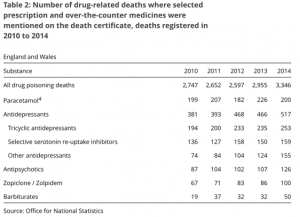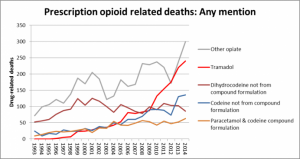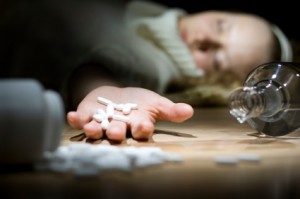Is Medical Cannabis the Answer to Britain’s Growing Pharmaceutical Drug Crisis?
- Thousands of people overdose on pharmaceutical prescription drugs every year in the UK
- 1,195 people overdosed on legal pharmaceutical drugs in 2014
- A leading pathologist recently called for prescription painkiller Tramadol to be upgraded to a Class A following hundreds of deaths relating to the drug
- Thousands of patients worldwide have been replacing Tramadol and other prescription drugs with medical cannabis
Thousands of people are being prescribed pharmaceutical medications in the UK every year, leading to fatal addictions.
The Office for National Statistics (ONS) found from its research that there is an “underlying pattern” of increasing deaths in which an opioid pain medicine (OPM), especially tramadol, is mentioned. Does the UK have a growing problem with opioids? Can medicinal cannabis be the answer?
A study from the University of Victoria, Canada, last year found that people are increasingly ditching their prescription medications with medical marijuana, suggesting that cannabis can offer a potentially safer alternative to deadly, highly-addictive, pharmaceutical drugs.
Following an influx of deaths related to Tramadol, the most popular painkiller in the UK, leading pathologist, Professor Jack Crane, made calls for the British Government to upgrade Tramadol to a Class A.
Thousands of people in the U.K. take fatal doses of prescription drugs every year. According to the ONS, there were 3,674 drug poisoning deaths involving legal and illegal drugs in 2015. Of these, 1,195 (33%) exclusively involved legal drugs, while illegal drugs were involved in the remaining 67%.
After Diazepam, Tramadol is the leading legal drug people are overdosing on in the UK. According to the ONS, 240 people died from a fatal Tramadol overdose in 2014, with 258 dying from fatal doses of Diazepam (latest available figures).
Over half (53%) of all drug-related deaths in 2014 related to drug poisoning involving an opiate drug, but this does include heroin.
Opiates are having such a negative impact on British society that Harry Shapiro, head of addiction charity DrugWise, has said Britain is currently in the middle of a “public health disaster.”
Without addressing the serious issue opioids pose, Britain could follow the same path America has taken. In the USA, opioids (including prescription opioids and heroin) killed more than 33,000 people in 2015. Of these deaths, nearly half of all opioid overdose deaths involve a prescription opioid.
Can cannabis be the answer to Britain’s growing legal drug crisis? While opioids are killing thousands, every year, cannabis has not killed a single person, ever.
Research has already shown that patients addicted to prescription and opioid-based drugs are able to use cannabis as a “harm reduction role in the context of use,” of alcohol, illicit drugs, and prescription drugs.
We decided to speak to real medical patients addicted to prescription drugs to find out if cannabis has the potential to treat the symptoms people use prescription pharmaceutical drugs for, and if they had been able to replace the dangerous prescription drug with a safer alternative.
Hundreds of people in the U.K. are finding success with cannabis-based treatment for the same symptoms doctors prescribe dangerous, addictive, pharmaceutical drugs.
One of the major reasons people seem to be turning to medical marijuana, opposed to pharmaceuticals, is the debilitating side-effects that often come with them.
Thomas, who suffers from Porphyria and Mesenteric Lymphadenitis, had been prescribed a cocktail of Tramadol, Dihydrocodeine, Oxycodone, Oramorph, Morphine Sulphate, Fentanyl, Diazepam (Valium) and Naproxen.
Thomas explained that he began treating his symptoms with cannabis as the pharmaceuticals left him “like a zombie night and day,” to the point where he “didn’t have a life.”
After Thomas decided to start using medical cannabis, his life completely changed: “Without cannabis, I wouldn’t have a life and I wouldn’t be able to be a dad to my beautiful daughter.”
It’s given me my life back.
This was a common response. Pharmaceuticals have been robbing people of their identity, as another medical cannabis patient, Amanda, who found herself addicted to prescription drugs following a traumatic event in her childhood, explained.
After surviving parental-rape, Amanda was sent into a “spiral of depression” after the birth of her second child:” The birth was so painful it brought back the memories of the trauma, having bad flashbacks etc. I hated myself so badly to the point I started self-harming.”
Like many patients suffering from PTSD and depression, Amanda was prescribed Diazepam (Valium), which gave her short-term relief. Long-term, however, the drug left Amanda feeling worse than before, leading her to be prescribed even more drugs: “it drove me more mental ill! I was put on Temazepam, Chlorpromazine, Sodium valproate and Quetiapine.”
The drugs left Amanda “numb,” exacerbating the symptoms she was trying to initially relieve:
“I was so numb that I couldn’t relate to anything. I had no emotion or motherly connection for my kids, no expression on my face. It was like my whole body was numb and I was screaming on the inside for help.
“I was suffering severe PTSD at this point. I tried to commit suicide and I even found myself hanging off a bridge.
“I didn’t want to die, I just felt I couldn’t cope with the mental abuse inside my head. I had no words for conversation. It’s quite hard to explain, to be honest.”
Amanda was able to wean herself off this toxic cocktail of drugs using cannabis. Having smoked it since 14, Amanda only realised the plant’s true medicinal value when she began to use it in a medical capacity:
“I carried on smoking weed and weaned myself off most of the meds. I got my kids back and that alone changed so much!
“Eight years later and I’m still smoking weed and only rely on one tablet (when needed) but I much prefer a joint!
“If I didn’t have weed in my life back then, I know for sure I wouldn’t be here!” I would recommend medical cannabis to anyone!
A common side-effect patients report about antidepressant drugs is, ironically, depression and suicidal thoughts. Drew was prescribed Seraltrine, Diazepam, Zopiclone, Quetiapine, Naproxen, Zapain, and Sertraline for his mental illnesses, including anxiety, depression and OCD.
Rather than treat Drew’s depression, the drugs intensified the symptoms. Cannabis, however, provided unparalleled relief: “I can’t stand the side-effects of the Quetiapine, Zapain or the Diazepam. I was so sleepy all the time and it messed with my head.
“With the cannabis, I get none of that!
“I can wake up suicidal, but once I medicate with cannabis my mood totally changes to more positive thoughts. It also helps me deal with my pain a lot more.
“I’ve managed to stop the Zapain, Diazepam and Quetiapine and only take 100 mg of Seraltrine.”
According to David Mericle, a senior U.S. economist at Goldman Sachs, the opioid crisis has become so severe in America that it may be negatively affecting the American economy, potentially costing the American economy $78.5bn a year.
According to Mericle, Americans addicted to prescription drugs are actively not looking for jobs; not only because of the numerous side-effects mentioned above but also because those applying for jobs are failing their drug tests.
Before his crippling arthritis forced him into a hip operation, Chester had been a productive worker, putting in 12-hour shifts a day. Following the operation, Chester was prescribed Tramadol, Gabapentin, Sertraline and Co-codamol, leaving him unable to return to work:
“I’ve worked all my life, 12 hours a day for the last 12 years. I’d never even taken prescription drugs until last year when I was forced to have a hip operation through ostio-arthritis.
“After the first operation, there was just pain, leading me to be prescribed several pharmaceutical drugs.
The last 11 months on the prescription drugs has totally destroyed my life.
“Since being on the tablets I don’t sleep, I don’t eat, I wake up every day with no energy, and have more or less been a ‘sofa-cabbage’ for the last 11 months.”
Due to the side-effects of the prescription drugs, Chester was unable to return to work. Cannabis, however, has provided him with hope that he may one day be able to get back to a normal, working life:
“After a bit of research, I decided to stop taking these prescribed drugs and just smoking cannabis.
“After 2 months of no tablets, and just smoking cannabis, I’ve put 2 stone back on. I’ve been waking up with more energy! I’m slowly getting better.”
Leanna’s work life was also “destroyed” after she prescribed Tramadol, Pregabalin, Sertraline and morphine for Fibromyalgia and ME, leaving her “in constant pain.”
It must be remembered that cannabis is still an illegal substance, often preventing potential patients from accessing it, as Leanna explained: “I have used cannabis for a long time now. Mostly I smoke it at night to help my muscles relax and help me sleep.
“I don’t smoke it every night as it depends if I have any. But, I know when I’ve not got any how much I will struggle.
“I had a good life and a career before FMS took over me in 1998. Now it’s a constant round of medication, pain, sleep, exhaustion and everything else that goes with it.”
Due to cannabis’ Schedule I and Class B status, it can be difficult for patients to obtain the illegal drug, often forcing them to fund the black market trade, which inevitably funds violent organised crime.
Drew explained that he one of the main reasons he wants cannabis to be legalised for medicinal uses is the unreliability of the black market: “Buying from the black market is not good for people, as you haven’t a clue what you are getting!”
While some patients are forced into funding organised crime, others, who are able, choose to grow their own, like Harry, who uses cannabis to treat depression after he found that the numerous pharmaceutical drugs he was prescribed were not working:
“I’ve suffered from depression since my early 20s, I’m 48 now, and tried numerous pharmaceutical drugs. Some helped some didn’t.
“I started smoking cannabis and it really seemed to help the situation, so I decided to start growing my own.
“I didn’t need any anti-depressants and managed to hold down the same job for 13 years.”
While funding organised crime may be a serious concern for medical patients, the risk of loss of personal freedom can be greater, as Harry explained:
“On Halloween, 2012 I received the dreaded knock. I got busted for growing. They destroyed the whole lot, took away my medication.
“I then started to become stressed, anxious, etc. and ended back at the doctors. I’m now back on the drugs they supply and, unfortunately, I’m no longer able to work.”
If cannabis can help these people successfully treat the same symptoms which doctors and GPs are prescribing deadly pharmaceutical drugs for; does that alone not prove that cannabis has medicinal value? If so, it only follows basic logic that it must be immediately removed from the Schedule I classification, meaning it has “no medicinal value.”
If we do not address the growing pharmaceutical drug crisis growing in the U.K., we could end up with a situation similar to American states which do not have legal cannabis. The fact that the hospitalization rate for opioid abuse and dependence in states with medical marijuana are roughly 23% lower than states without legal access, shows just how effective legalising medicinal cannabis can be.
Have you had negative experiences with pharmaceutical drugs? Have you been able to replace these with medical marijuana? Let us know in the comments!




This is ridiculous ,smoking is bad for you whatever you put in your roll up . Proper medical cannabis comes in tablet form .I just wish I knew where to get it.
Hi John, we could not agree more. This website and its contributors do not condone smoking under any circumstances. However, medical cannabis comes in many forms – tablets or capsules being just one of them. You can also find it as an oil, raw plant matter, butter..etc. It is the inherent properties of the cannabis strains these medicines are derived from that determine their suitability for treating various ailments. Some strains contain higher CBD concentration or less THC than others for example. The balance of these active compounds gives different strains different therapeutic qualities. You can read more on this topic here: http://medicalmarijuana.co.uk/information/products-extracts/
Unfortunately, legal access here in the UK is not straight forward. Please refer to our article on legal access for more information: http://medicalmarijuana.co.uk/legal/legal-access/
I was incredibly surprised to read that 33% of drug poising deaths were caused by Legal Drugs. WOW! I couldn’t agree more with the points made. I was an addict myself a while back and I’m so thankful that I managed to quit. I knew a lot of people that took Marijuana for genuine purposes like the methods that you described and it allowed them to live a much better life. One particular friend of mine had Cerebral Palsy and I honestly don’t know how he’d survive without Medically induced Marijuana. I’m sure the UK will make a big step to allow it as I am very passionate about this area. I’m now trying to help as many people as possible quit smoking Marijuana, as it’s very harmful. I’ll be potentially citing some of this information on my blog – thank you for taking the time to write!